孔德圣石 作业 7.29 初一下册语法精讲之一般现在时
7年级下册语法知识点总结
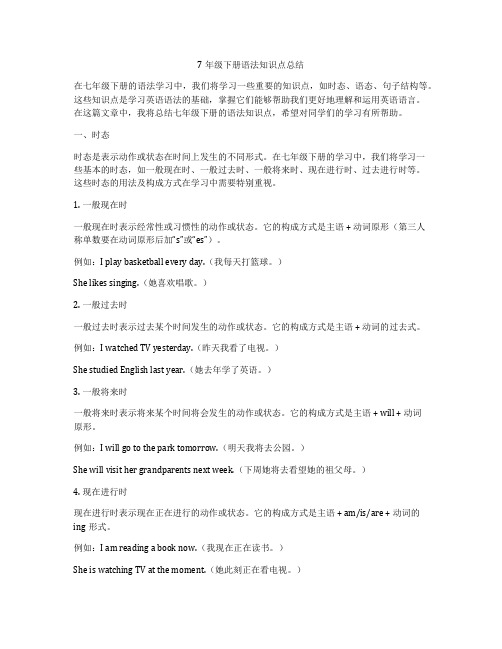
7年级下册语法知识点总结在七年级下册的语法学习中,我们将学习一些重要的知识点,如时态、语态、句子结构等。
这些知识点是学习英语语法的基础,掌握它们能够帮助我们更好地理解和运用英语语言。
在这篇文章中,我将总结七年级下册的语法知识点,希望对同学们的学习有所帮助。
一、时态时态是表示动作或状态在时间上发生的不同形式。
在七年级下册的学习中,我们将学习一些基本的时态,如一般现在时、一般过去时、一般将来时、现在进行时、过去进行时等。
这些时态的用法及构成方式在学习中需要特别重视。
1. 一般现在时一般现在时表示经常性或习惯性的动作或状态。
它的构成方式是主语 + 动词原形(第三人称单数要在动词原形后加“s”或“es”)。
例如:I play basketball every day.(我每天打篮球。
)She likes singing.(她喜欢唱歌。
)2. 一般过去时一般过去时表示过去某个时间发生的动作或状态。
它的构成方式是主语 + 动词的过去式。
例如:I watched TV yesterday.(昨天我看了电视。
)She studied English last year.(她去年学了英语。
)3. 一般将来时一般将来时表示将来某个时间将会发生的动作或状态。
它的构成方式是主语 + will + 动词原形。
例如:I will go to the park tomorrow.(明天我将去公园。
)She will visit her grandparents next week.(下周她将去看望她的祖父母。
)4. 现在进行时现在进行时表示现在正在进行的动作或状态。
它的构成方式是主语 + am/is/are + 动词的ing形式。
例如:I am reading a book now.(我现在正在读书。
)She is watching TV at the moment.(她此刻正在看电视。
)5. 过去进行时过去进行时表示过去某个时间正在进行的动作或状态。
仁爱英语七年级下册语法讲解:一般现在时、现在进行时及一般过去时

一般现在时、现在进行时、一般过去时
时态
Tense
在英语中,不同时间发生的动作 或存在的状态要用不同的动词形式来 表现。
重点掌握
每种时态的概念、信息词、 结构、句式变化、以及某些时态 间的相互区别
①Be动词 am、is、are/was、were
②助动词(只能和主要动词一起构成各种时态,语态 和语气等动词形式。) do、does/did/done ③情态动词(表示能力,义务,必要,猜测等说话人 的语气或情态。情态动词只能和动词原形一起构成谓 语动词。) can、may、could、need、must、shoud
What did you do yesterday?
They were in Beijing a week ago.
I played football last night.
2. 句子构成: “主语+动词的过去式+其他”; 1) 系动词be的过去时: am(is) →was
are → were
陈述句:主语+be动词的过去式+其他
第三人称单数 study- studies
过去式 need- needed
look - looking
begin- beginning use-
一般现在时
一般现在时表常常发生的动作或经常存在的状态, 常 和always, often, usually, every day, sometimes等表示 时间的状语连用. e.g. I go to school every day. He is always like that. Where do you live? What do you do here?
注意:在否定句或者疑问句中,有了助动词 did后,行为动词要还原, 不能再写成过去式.
七年级英语七年级下册时态复习

七年级英语七年级下册时态复习在七年级英语下册的学习中,时态是非常重要的语法知识点。
掌握好时态,对于我们准确地表达思想、理解英语语言有着至关重要的作用。
接下来,让我们一起对七年级下册所学的时态进行一次全面的复习。
一、一般现在时一般现在时表示经常发生的动作或存在的状态。
当主语是第三人称单数时,动词要发生相应的变化。
比如,“He plays football every day” 中的“plays”就是动词“play”的第三人称单数形式。
一般现在时的构成:1、主语+ be(am/is/are)+表语I am a studentThey are happy2、主语+实义动词(注意第三人称单数形式)We study hardShe likes music常与一般现在时连用的时间状语有:always, usually, often, sometimes, never, every day/week/month/year 等。
二、现在进行时现在进行时表示正在进行的动作。
其构成是“主语+be(am/is/are)+现在分词”。
例如,“I am reading a book now”现在分词的构成规则:1、一般情况下,直接在动词后加 ing,如:read reading。
2、以不发音的 e 结尾的动词,去掉 e 再加 ing,如:write writing。
3、以重读闭音节结尾,且末尾只有一个辅音字母的动词,双写这个辅音字母再加 ing,如:run running。
常与现在进行时连用的时间状语有:now, at the moment, look, listen 等。
三、一般过去时一般过去时表示过去发生的动作或存在的状态。
其构成有两种:1、主语+ was/were +表语I was at home yesterdayThey were late for school2、主语+动词的过去式She played the piano last nightWe went to the zoo last week动词过去式的构成规则有很多,常见的有:1、一般在动词后加 ed,如:work worked。
七年级下册英语语法总复习--初一下册
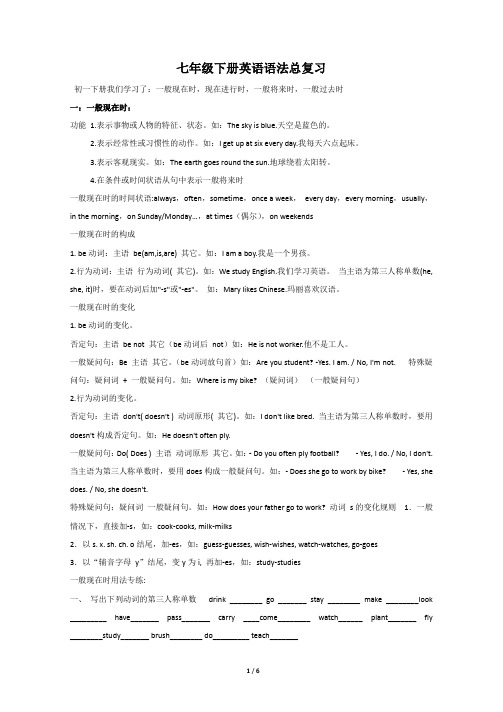
七年级下册英语语法总复习初一下册我们学习了:一般现在时,现在进行时,一般将来时,一般过去时一:一般现在时:功能1.表示事物或人物的特征、状态。
如:The sky is blue.天空是蓝色的。
2.表示经常性或习惯性的动作。
如:I get up at six every day.我每天六点起床。
3.表示客观现实。
如:The earth goes round the sun.地球绕着太阳转。
4.在条件或时间状语从句中表示一般将来时一般现在时的时间状语:always,often,sometime,once a week,every day,every morning,usually,in the morning,on Sunday/Monday…,at times(偶尔),on weekends一般现在时的构成1. be动词:主语be(am,is,are) 其它。
如:I am a boy.我是一个男孩。
2.行为动词:主语行为动词( 其它)。
如:We study English.我们学习英语。
当主语为第三人称单数(he, she, it)时,要在动词后加"-s"或"-es"。
如:Mary likes Chinese.玛丽喜欢汉语。
一般现在时的变化1. be动词的变化。
否定句:主语be not 其它(be动词后not)如:He is not worker.他不是工人。
一般疑问句:Be 主语其它。
(be动词放句首)如:Are you student? -Yes. I am. / No, I'm not. 特殊疑问句:疑问词+ 一般疑问句。
如:Where is my bike? (疑问词)(一般疑问句)2.行为动词的变化。
否定句:主语don't( doesn't ) 动词原形( 其它)。
如:I don't like bred. 当主语为第三人称单数时,要用doesn't构成否定句。
人教版七年级下册英语Unit 10 语法知识归纳
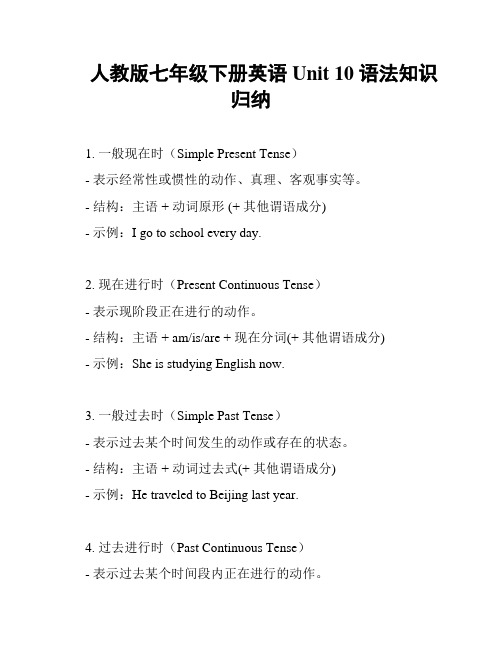
人教版七年级下册英语Unit 10 语法知识归纳1. 一般现在时(Simple Present Tense)- 表示经常性或惯性的动作、真理、客观事实等。
- 结构:主语 + 动词原形 (+ 其他谓语成分)- 示例:I go to school every day.2. 现在进行时(Present Continuous Tense)- 表示现阶段正在进行的动作。
- 结构:主语 + am/is/are + 现在分词(+ 其他谓语成分)- 示例:She is studying English now.3. 一般过去时(Simple Past Tense)- 表示过去某个时间发生的动作或存在的状态。
- 结构:主语 + 动词过去式(+ 其他谓语成分)- 示例:He traveled to Beijing last year.4. 过去进行时(Past Continuous Tense)- 表示过去某个时间段内正在进行的动作。
- 结构:主语 + was/were + 现在分词(+ 其他谓语成分)- 示例:They were playing basketball yesterday.5. 将来时(Future Tense)- 表示将来会发生的动作或存在的状态。
- 结构:主语 + will + 动词原形(+ 其他谓语成分)- 示例:We will have a party next week.6. 助动词的用法- “do”及其变化形式可用于否定句、疑问句和强调句。
- “be”用于进行时态和被动语态。
- “have”可用于完成时态。
- 示例:She doesn't like swimming. Did you go to the park? I do like chocolate.7. 特殊疑问词的用法- 针对特定方面的问题,使用特殊疑问词进行提问。
- 示例:What is your favorite color? Where did you go on vacation?以上是人教版七年级下册英语Unit 10关于语法知识的归纳。
初一英语语法知识点:一般现在时
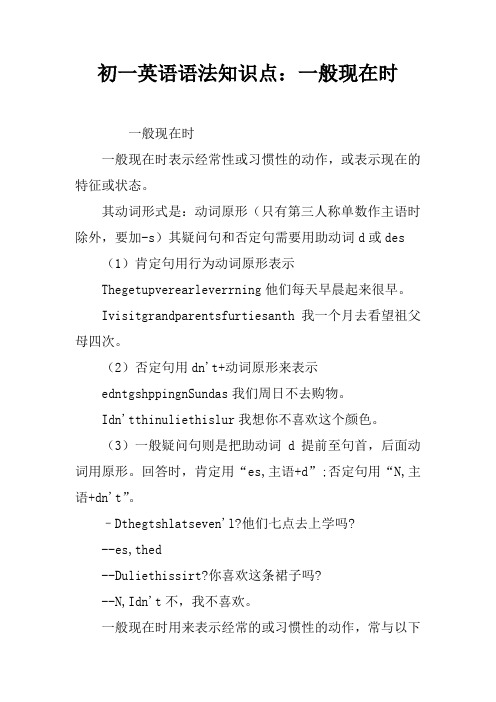
初一英语语法知识点:一般现在时一般现在时一般现在时表示经常性或习惯性的动作,或表示现在的特征或状态。
其动词形式是:动词原形(只有第三人称单数作主语时除外,要加-s)其疑问句和否定句需要用助动词d或des (1)肯定句用行为动词原形表示Thegetupverearleverrning他们每天早晨起来很早。
Ivisitgrandparentsfurtiesanth我一个月去看望祖父母四次。
(2)否定句用dn't+动词原形来表示edntgshppingnSundas我们周日不去购物。
Idn'tthinuliethislur我想你不喜欢这个颜色。
(3)一般疑问句则是把助动词d提前至句首,后面动词用原形。
回答时,肯定用“es,主语+d”;否定句用“N,主语+dn't”。
–Dthegtshlatseven'l?他们七点去上学吗?--es,thed--Duliethissirt?你喜欢这条裙子吗?--N,Idn't不,我不喜欢。
一般现在时用来表示经常的或习惯性的动作,常与以下的时间状语连用:ften经常,alas总是,seties有时,usuall 通常,everda/ee每天/周等。
Heusuallgestshlbbie通常他骑车上学。
Ivisitgrandparentseveree我每个星期都去看祖父母。
Sheisalaslatefrlass她总是上迟到。
parentsandIsetiesgutteat我和父母有时出去吃饭。
Itftenrainshere这儿常常下雨。
主语为第三人称单数时的一般现在时一般现在时态,当主语为第三人称单数时,谓语动词也要是第三人称单数,后要加-s或-es。
Heliesreadingatnight他喜欢夜里读书。
Sheusuallgestshlbbie她平时骑车上学。
Thelittleatdrinsileverda小猫每天都喝牛奶。
转换成否定句要加desn't,其后的动词用原形。
七年级下学期语法知识点

七年级下学期语法知识点在学习英语过程中,语法是一个非常重要的环节。
掌握语法知识是提高英语能力的关键。
在七年级下学期中,我们学习了许多重要的语法知识点。
接下来,本文将分别介绍这些知识点。
一、动词时态动词时态是英语语法中最基本、最重要的部分之一。
我们在七年级下学期中学习了四种时态:一般现在时、一般过去时、一般将来时和现在进行时。
1. 一般现在时一般现在时表示现在或经常性的动作或状态。
例如:I study English every day.(我每天学英语。
)2. 一般过去时一般过去时表示已经结束的过去时间里完成的动作。
例如:Yesterday, I went to the park.(昨天,我去了公园。
)3. 一般将来时一般将来时表示发生在将来的动作。
例如:I will visit my grandparents next week.(下周我将会去看望我的祖父母。
)4. 现在进行时现在进行时表示正在发生的动作。
例如:I am studying English now.(我正在学英语。
)二、名词性从句名词性从句是一个比较难懂的语法知识点。
它是在句子中充当名词的从句。
名词性从句可以分为三种类型:主语从句、宾语从句和表语从句。
1. 主语从句主语从句充当整个句子的主语。
例如:What he said was very interesting.(他说的话很有意思。
)2. 宾语从句宾语从句通常作为句子的宾语。
例如:I know that you are a good student.(我知道你是一个好学生。
)3. 表语从句表语从句用作句子的表语部分。
例如:My hope is that we can be good friends.(我希望我们能成为好朋友。
)三、形容词和副词形容词和副词是英语语法中最重要的两个部分之一。
它们描述名词和动词的性质。
形容词通常用来描述名词,而副词则用来修饰动词、形容词和其他副词。
1. 形容词形容词可以用来描述名词的质量和数量等特征。
七年级下册语法知识点总结
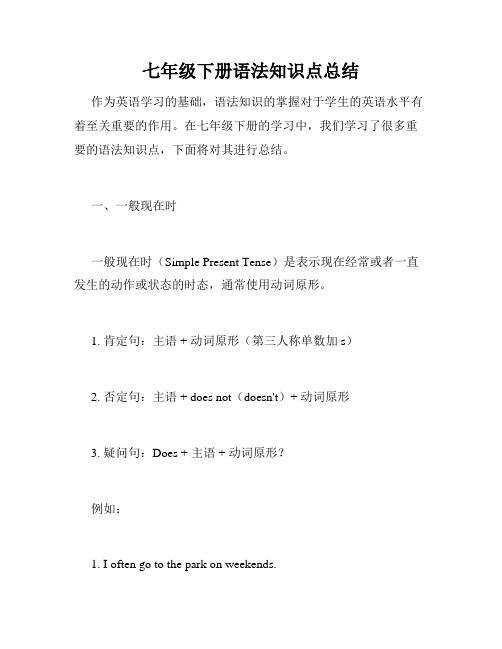
七年级下册语法知识点总结作为英语学习的基础,语法知识的掌握对于学生的英语水平有着至关重要的作用。
在七年级下册的学习中,我们学习了很多重要的语法知识点,下面将对其进行总结。
一、一般现在时一般现在时(Simple Present Tense)是表示现在经常或者一直发生的动作或状态的时态,通常使用动词原形。
1. 肯定句:主语 + 动词原形(第三人称单数加s)2. 否定句:主语 + does not(doesn't)+ 动词原形3. 疑问句:Does + 主语 + 动词原形?例如:1. I often go to the park on weekends.2. She doesn't like coffee.3. Do you play computer games at home?二、一般过去时一般过去时(Simple Past Tense)是表示过去某一时间发生的动作或状态的时态,通常使用动词的过去式形式。
1. 肯定句:主语 + 动词过去式2. 否定句:主语 + did not(didn't)+ 动词原形3. 疑问句:Did + 主语 + 动词原形?例如:1. I went to the cinema last night.2. They didn't travel to Japan last year.3. Did you see the movie yesterday?三、一般将来时一般将来时(Simple Future Tense)是表示将来发生或者打算发生的动作或状态的时态,通常用“will/shall + 动词原形”。
1. 肯定句:主语 + will/shall + 动词原形2. 否定句:主语 + will not(won't)+ 动词原形3. 疑问句:Will/Shall + 主语 + 动词原形?例如:1. I will visit my grandparents this weekend.2. They won't come to the meeting tomorrow.3. Will you go to the concert next Saturday?四、现在进行时现在进行时(Present Continuous Tense)是表示现在正在进行的动作或状态的时态,通常使用“be + V-ing”。
七年级下时态知识点归纳
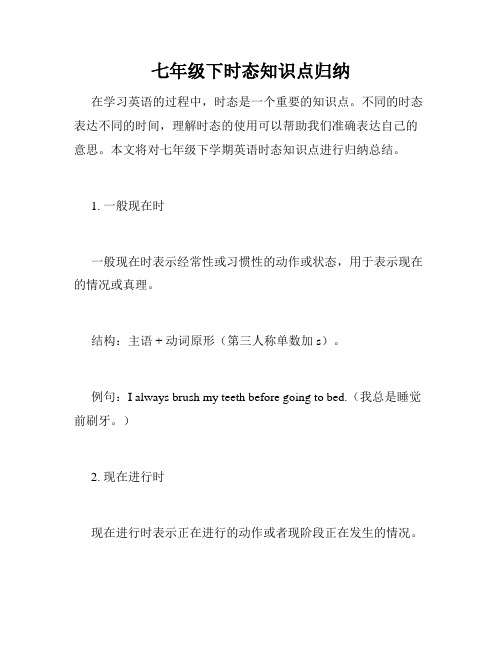
七年级下时态知识点归纳在学习英语的过程中,时态是一个重要的知识点。
不同的时态表达不同的时间,理解时态的使用可以帮助我们准确表达自己的意思。
本文将对七年级下学期英语时态知识点进行归纳总结。
1. 一般现在时一般现在时表示经常性或习惯性的动作或状态,用于表示现在的情况或真理。
结构:主语 + 动词原形(第三人称单数加s)。
例句:I always brush my teeth before going to bed.(我总是睡觉前刷牙。
)2. 现在进行时现在进行时表示正在进行的动作或者现阶段正在发生的情况。
结构:主语 + am/is/are + doing。
例句:I am reading a book now.(我正在看书。
)3. 一般过去时一般过去时表示过去发生的动作或状态。
结构:主语 + 动词的过去式。
例句:He played football yesterday.(他昨天踢足球。
)4. 过去进行时过去进行时表示过去某一时间正在进行的动作。
结构:主语 + was/were + doing。
例句:We were studying English at this time last night.(昨晚这个时候我们在学英语。
)5. 一般将来时一般将来时表示将来的某个时间会发生的动作或状态。
结构:主语 + will/shall + 动词原形。
例句:I will go to school tomorrow.(我明天上学。
)6. 现在完成时现在完成时表示过去发生的动作对现在产生的影响或结果。
结构:主语 + have/has + 过去分词。
例句:I have finished my homework.(我已经完成了我的作业。
)7. 过去完成时过去完成时表示在过去某一时刻之前已经完成的某个动作或状态。
结构:主语 + had + 过去分词。
例句:By the time I got home, he had already left.(当我回家时,他已经离开了。
孔德圣石 作业 7.29 语法精讲之一般现在时
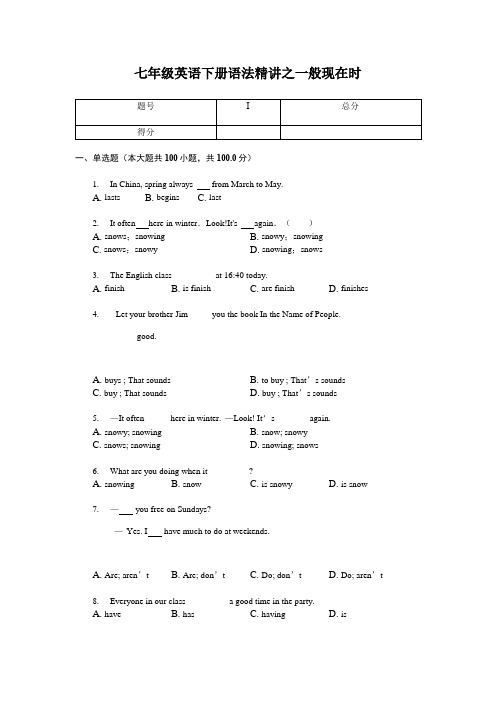
七年级英语下册语法精讲之一般现在时一、单选题(本大题共100小题,共100.0分)1.In China, spring always from March to May.A. lastsB. beginsC. last2.It often here in winter.Look!It's again.()A. snows;snowingB. snowy;snowingC. snows;snowyD. snowing;snows3.The English class _________ at 16:40 today.A. finishB. is finishC. are finishD. finishes4.--Let your brother Jim_____ you the book In the Name of People.-- _______ good.A. buys ; That soundsB. to buy ; That’s soundsC. buy ; That soundsD. buy ; That’s sounds5.—It often _____ here in winter. —Look! It’s _______ again.A. snowy; snowingB. snow; snowyC. snows; snowingD. snowing; snows6.What are you doing when it _________?A. snowingB. snowC. is snowyD. is snow7.— you free on Sundays?—Yes. I have much to do at weekends.A. Are; aren’tB. Are; don’tC. Do; don’tD. Do; aren’t8.Everyone in our class _________ a good time in the party.A. haveB. hasC. havingD. is9.Students ______ for nine hours a day.A. sleepsB. sleepC. are sleepD. sleeping10.Frank with his parents __________ breakfast at home. It’s happy for them to have it together.A. to haveB. haveC. hasD. having11.Tom with his friends ______ to the zoo every month.A. goesB. goC. is goingD. are going12.The number of students in Class Ten _____sixty-six, and a large number of them ___ Jay Zhou.A. are, likesB. is, likesC. is, likeD. are, like13.These shoes_____nice. I’ll take a ________.A. looks; oneB. look; shoeC. look; pairD. looks; pair14.Your father ______ buy another TV set.A. doesn’t need toB. needn’t toC. doesn’t needD. needs not to15.Kim with his friends often ________ basketball on weekends.A. playB. playsC. is playingD. are playing16.Where _____ lions come _____ ?A. are; inB. do; fromC. do; inD. are; from17.Five kilometers ______ not very far, you can ride a bike there.A. isB. areC. was18.________he________? No, I ________ not.A. Can, swim, amB. Can, dance, canC. Can, sing, am afraidD. Can, runs, think19.The head teacher with his students ________ Xihui Park if it ________ tomorrow.A. is going to; doesn't rainB. are going to; won't rainC. is going to; won't rainD. are going to; doesn't rain20.The young man’s mother wants to know if he ______her next week. If he _______no time tomorrow, she’ll come to see him.A. visits; will have;B. will visit; will haveC. will visit; hasD. visits; has21.—Look,what a nice library!—Yes, we ____________it every day.A. cleanB. are cleaningC. cleansD. cleaning22.She_______cooking_______her mother.A. is like; likesB. like; likesC. likes; is likeD. likes; like23.The price of these trousers ________$20, and this pair of shoes ________$30.A. is, areB. is, isC. are, isD. are, are24.Everyone ________ him because he often ________ jokes.A. is like, tellsB. is likes, tellingC. likes, tellsD. like, tells25.Jimmy, ______ his brother, ________ playing computer games.A. like,likeB. likes, likesC. like, likesD. likes, like26.--Who_________Chinese? --Mr.Liu.A. teach youB. teaches herC. teaches myD. teaches their27.My teachers ______ Chinese.A. amB. isC. beD. are28.Be careful! Here ________!A. comes the trainB. the train comesC. comes itD. the train is coming29.–Can you tell me _________?A. where does Tom liveB. where Tom livesC. Tom lives whereD. where lives Tom30.There ________some good news for us now.A. isB. areC. wasD. were31.-The party starts at seven, it? -No, it starts in half an hour.A. isn’tB. doesn’tC. doesD. is32.The man ________ curly brown hair ________ a blue sweater.A. has hasB. with; isC. has; wearsD. with; wears33.If it _____ tomorrow, we’ll go camping at cool city .A. not rainB. don’t rainC. won’t rainD. doesn’t rain34.He will call you as soon as he ________ Guilin.A. get toB. arrives atC. reaches toD. arrives in35.No one in our class _____ swimming.A. likesB. likeC. to likeD. is like36.He has few books in his bookcase, ____ _____?A. hasn’t heB. isn’t heC. doesn’t heD. does he37.One of the girls _____ to the USAA. comeB. comesC. areD. goes38.Water _______ 70% of the human body.A. is made ofB. is made up ofC. makes upD. makes from39.Each panda lots of bamboo every day.A. need eatB. need eatingC. need to eatD. needs to eat40.Everyone in our class hard at school.A. studyB. are studyingC. studiesD. studying41.Be careful when you ________ the road.A. acrossB. crossC. throughD. go42.This pair of shoes ______ hand,and it______ very comfortable.A. is made withB. are made from;is feltC. are made of;feelD. is made by;feels43.I will go on a picnic if it ________________ tomorrow.A. won’t rainB. will rainC. rainsD. doesn’t rain44.I____ the book ____ very interesting.A. think; isn’tB. thinks; notC. don’t think; isD. don’t think; not45.If you ________ tomorrow, shall we go boating on the lake ?A. will freeB. will be freeC. are freeD. have free46.Mr Simmons________ a medium build, and he has yellow hair.A. isB. hasC. looks likeD. isn’t47.—________ the man in white Mr. Xu? —No, Mr. Xu ________ glasses.A. Does; doesn’t wearB. Is; doesn’t wearC. Does; isn’t wearD. Is; isn’t wear48.All the food ______the plates _______.A. in, taste wellB. on , tastes wellC. on, tastes niceD. in , tastes nice49.If I ________ next Sunday, I’ll visit my grandparents.A. will be freeB. am freeC. will freeD. isn’t free50.The clothes store is on ________. It ________ all kinds of sweaters.A. sells, sellsB. sale, sellC. sell, salesD. sale, sells。
七年级英语下册语法专项一般现在时知识点梳理
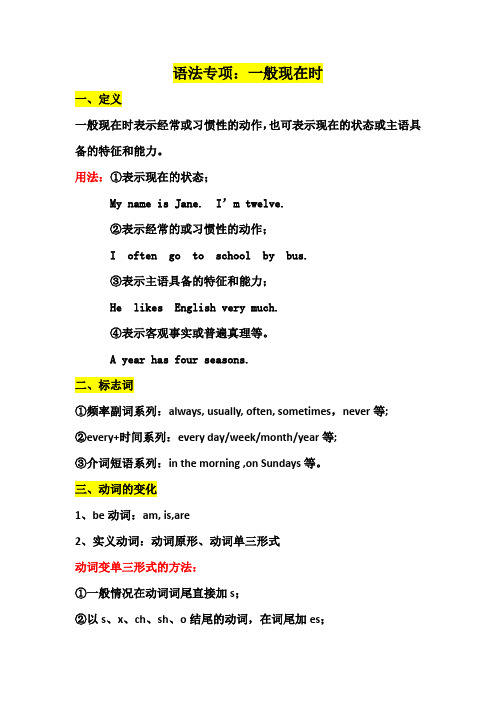
语法专项:一般现在时一、定义一般现在时表示经常或习惯性的动作,也可表示现在的状态或主语具备的特征和能力。
用法:①表示现在的状态;My name is Jane. I’m twelve.②表示经常的或习惯性的动作;I often go to school by bus.③表示主语具备的特征和能力;He likes English very much.④表示客观事实或普遍真理等。
A year has four seasons.二、标志词①频率副词系列:always, usually, often, sometimes,never等;②every+时间系列:every day/week/month/year等;③介词短语系列:in the morning ,on Sundays等。
三、动词的变化1、be动词:am, is,are2、实义动词:动词原形、动词单三形式动词变单三形式的方法:①一般情况在动词词尾直接加s;②以s、x、ch、sh、o结尾的动词,在词尾加es;③以辅音字母+y结尾的动词,把y变成i,再加es;以元音字母+y 结尾的动词直接+s;如:fly –flies play –plays④特殊变化:have has四、句型结构(1)含有be动词的一般现在时的句型a.肯定句主语+am/is/are+其他.b.否定句主语+am/is/are+not+其他.c.一般疑问句Be动词+主语+其他?肯定回答:Yes,主语+be动词.否定回答:No,主语+be动词+not.d.特殊疑问句特殊疑问词+be动词+主语+其他?(2)含有实义动词的一般现在时的句型a.肯定句主语+动词原形+其他.主语+动词单三形式+其他.b.否定句主语+don’t+动词原形.主语+doesn’t+动词原形.c.一般疑问句Do/Does +主语+动词原形+其他?肯定回答:Yes,主语+do./does.否定回答:No,主语+don’t./doesn’t.d.特殊疑问句特殊疑问词 +do/does+主语+动词原形+其他?注:当主语是非你(you)非我(I)非复数时,动词要用单三形式。
七(下)第三,四单元知识梳理

七(下)第三,四单元知识梳理第三单元一、语法1、一般现在时:表示经常性或习惯性的动作,常和表示频度的时间状语连用。
2、一般过去时:表示过去发生的动作或存在的状态,常和表示过去的时间状语连用。
3、现在进行时:表示正在进行的动作或存在的状态,常和表示现在的时间状语连用。
4、现在完成时:表示动作已经完成,常和表示过去的时间状语连用。
5、“used to do”结构:表示过去经常性或习惯性的动作,但现在不做了。
二、重点句型1、What did you do last weekend?2、I used to get up late on weekends.3、What were you doing at 8 o'clock yesterday morning?4、I was having breakfast at 8 o'clock yesterday morning.5、Did you go to the movies last night?6、No, I didn't. I stayed at home and watched TV.第四单元一、语法1、祈使句:表示一种命令、请求或劝告,一般不用于疑问句,但可用于感叹句中。
2、感叹句:表示感情的强烈表达,可以是祈使句、疑问句或陈述句。
3、虚拟语气:表示一种假设或与事实相反的假设,一般用于陈述句和疑问句中。
二、重点句型1、Let's go to the movies.2、What a beautiful day!3、If I had enough money, I would travel around the world.4、Would you like to go to the beach with me?5、I wish I could fly to the moon.6、If only I had studied harder!。
一般现在时七年级知识点
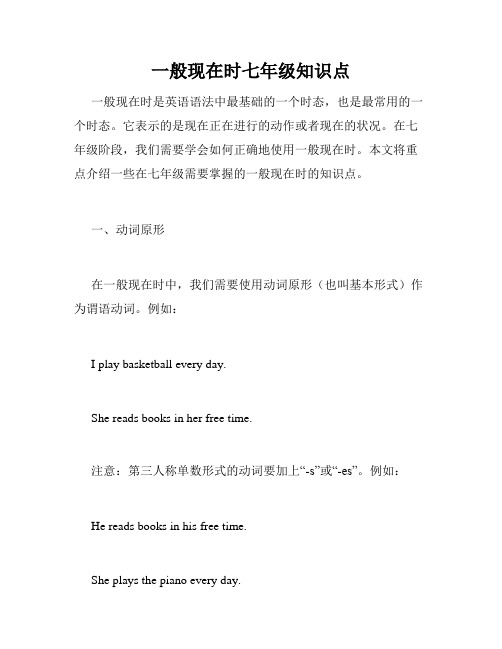
一般现在时七年级知识点一般现在时是英语语法中最基础的一个时态,也是最常用的一个时态。
它表示的是现在正在进行的动作或者现在的状况。
在七年级阶段,我们需要学会如何正确地使用一般现在时。
本文将重点介绍一些在七年级需要掌握的一般现在时的知识点。
一、动词原形在一般现在时中,我们需要使用动词原形(也叫基本形式)作为谓语动词。
例如:I play basketball every day.She reads books in her free time.注意:第三人称单数形式的动词要加上“-s”或“-es”。
例如:He reads books in his free time.She plays the piano every day.二、第三人称单数形式第三人称单数形式指的是以“-s”或“-es”结尾的动词形式,是在句子中表示第三人称单数主语时使用的动词形式。
例如:He likes to play soccer.She teaches English at the school.注意:有些动词的第三人称单数形式并不是以“-s”或“-es”结尾,例如“have”、“do”等。
这些动词在第三人称单数时不需要变化。
三、句型在一般现在时中,我们需要掌握以下两种基本的句型。
1. 主语+动词原形例如:I play basketball every day.They sing songs in the classroom.2. 主语+助动词“do/does”+动词原形例如:Do you like to eat pizza?Does she go to school by bus?注意:在第三人称单数形式的句子中,需要使用助动词“does”,例如:Does he like to play soccer?Does she play the piano every day?四、时间状语在一般现在时中,我们通常会加上时间状语来表明动作发生的时间或者频率。
七年级下册英语11单元语法讲座

七年级下册英语11单元语法讲座摘要:I.引言- 介绍七年级下册英语11单元的语法讲座II.讲座内容概述1.一般现在时- 概念介绍- 构成及用法- 例子2.一般过去时- 概念介绍- 构成及用法- 例子3.一般将来时- 概念介绍- 构成及用法- 例子III.总结与回顾- 总结本讲座的主要内容- 回顾巩固所学语法知识的方法正文:【引言】七年级下册英语11单元的语法讲座主要涵盖了英语中一般现在时、一般过去时和一般将来时的相关知识。
这三种时态在英语中十分重要,因此,学生们应该认真学习并掌握它们。
【讲座内容概述】1.一般现在时- 概念介绍:一般现在时表示现在的习惯、事实或一般情况。
- 构成及用法:一般现在时的构成是主语+ 动词原形/三单形式(第三人称单数)+ 其它成分。
- 例子:I study English every day.(我每天学英语。
)2.一般过去时- 概念介绍:一般过去时表示过去某个特定时间发生的动作或存在的状态。
- 构成及用法:一般过去时的构成是主语+ 动词过去式+ 其它成分。
- 例子:I studied English yesterday.(我昨天学英语了。
)3.一般将来时- 概念介绍:一般将来时表示将来某个时间会发生的动作或存在的状态。
- 构成及用法:一般将来时的构成是主语+ 动词will + 动词原形+ 其它成分。
- 例子:I will study English tomorrow.(我明天会学英语。
)【总结与回顾】通过本次语法讲座的学习,相信同学们对一般现在时、一般过去时和一般将来时的概念、构成及用法有了更深入的了解。
为了更好地巩固所学知识,建议大家多进行实际语境中的练习,例如用所学时态描述日常生活、编写小故事等。
七年级下刚英语语法知识点

七年级下刚英语语法知识点在英语学习中,语法是一个十分重要的知识点,它直接影响着我们的英语表达能力。
在七年级下册的英语学习中,语法知识点也是非常重要的一部分。
下面,让我们来一起学习一下七年级下册英语语法知识点吧。
一、一般现在时一般现在时是英语语法中最基础的时态之一。
它用于描述一些经常发生的或者永久性的事情,表达一般的真理或者课本中的内容等。
例如:1. I usually get up at six o'clock.2. He speaks English very well.3. Water boils at 100 degrees Celsius.二、现在进行时现在进行时用于表达当前正在进行的动作。
这个时态通常由“be”动词加上动词的现在分词构成。
例如:1. She is reading a book.2. They are playing basketball.3. I am listening to music.三、一般过去时一般过去时用于描述过去发生的事情,通常是由动词的过去式构成。
例如:1. He went to buy groceries yesterday.2. They watched a movie last night.3. I studied English for three hours yesterday.四、过去进行时过去进行时用于表达过去某个时间正在进行的动作,它通常由“was/were”加上动词的现在分词构成。
例如:1. She was watching TV when I called her.2. They were playing video games all afternoon.3. I was studying for the test while my friends were playing outside.五、一般将来时一般将来时用于表达将来可能会发生的动作或者事件,它通常由“will”加上动词原形构成。
人教版七年级下册语法点
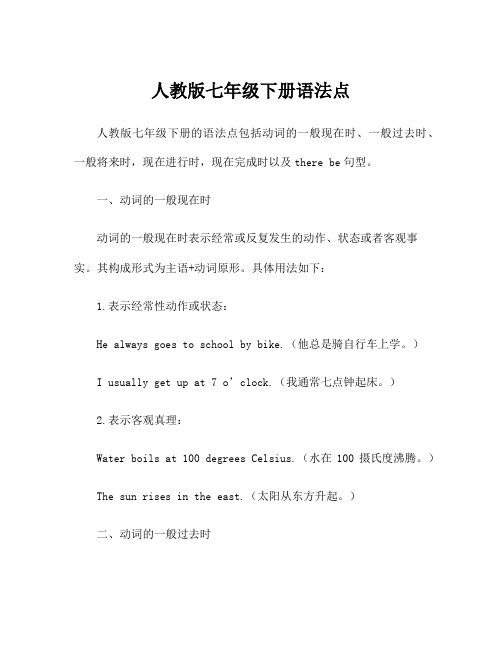
人教版七年级下册语法点人教版七年级下册的语法点包括动词的一般现在时、一般过去时、一般将来时,现在进行时,现在完成时以及there be句型。
一、动词的一般现在时动词的一般现在时表示经常或反复发生的动作、状态或者客观事实。
其构成形式为主语+动词原形。
具体用法如下:1.表示经常性动作或状态:He always goes to school by bike.(他总是骑自行车上学。
)I usually get up at 7 o’clock.(我通常七点钟起床。
)2.表示客观真理:Water boils at 100 degrees Celsius.(水在100摄氏度沸腾。
)The sun rises in the east.(太阳从东方升起。
)二、动词的一般过去时动词的一般过去时表示过去某个时刻或某个时间段发生的动作或状态。
其构成形式为主语+动词过去式。
具体用法如下:1.表示过去的经历或状态:I lived in Beijing for five years.(我在北京住了五年。
)2.表示过去习惯性的动作或状态:He often played basketball with his friends.(他经常和他的朋友们打篮球。
)三、动词的一般将来时动词的一般将来时表示将要发生的动作或状态。
其构成形式为主语+ will +动词原形。
具体用法如下:1.表示将要进行的动作:I will go to the park tomorrow.(我明天要去公园。
)2.表示意愿、决心或承诺:I will help you with your homework.(我会帮你做作业。
)四、现在进行时现在进行时表示目前正在进行的动作。
其构成形式为主语+am/is/are +动词-ing形式。
具体用法如下:1.表示现在正在进行的动作:We are studying English now.(我们现在正在学习英语。
)2.表示暂时的状态:She is staying at her friend's house.(她正在朋友家暂住。
孔德圣石 作业 7.28 一般现在时的用法
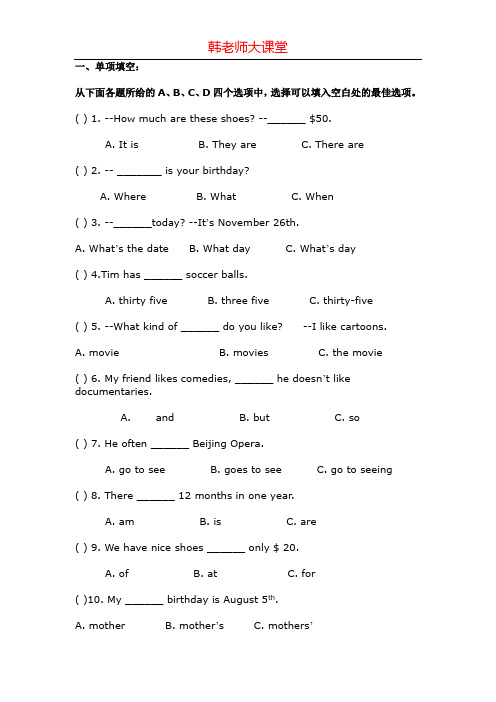
一、单项填空:从下面各题所给的A、B、C、D四个选项中,选择可以填入空白处的最佳选项。
( ) 1. --How much are these shoes? --______ $50.A. It isB. They areC. There are( ) 2. -- _______ is your birthday?A. WhereB. WhatC. When( ) 3. --______today? --It’s November 26th.A. What’s the dateB. What dayC. What’s day( ) 4.Tim has ______ soccer balls.A. thirty fiveB. three fiveC. thirty-five( ) 5. --What kind of ______ do you like? --I like cartoons.A. movieB. moviesC. the movie( ) 6. My friend likes comedies, ______ he doesn’t like documentaries.A.andB. butC. so( ) 7. He often ______ Beijing Opera.A. go to seeB. goes to seeC. go to seeing ( ) 8. There ______ 12 months in one year.A. amB. isC. are( ) 9. We have nice shoes ______ only $ 20.A. ofB. atC. for( )10. My ______ birthday is August 5th.A. motherB. mother’sC. mothers’( )11. --Do you have an Art Festival ______ your school? -- Yes, we do.A. atB. ofC. for( )12. --Does Jim go to a movie? -- ______.A. Yes, Jim doesB. Yes, he wantsC. Yes, he does ( )13. The ______ question is difficult.A. fiveB. fifthC. fiveth( )14. Great! They have skirts ______ many colors.A. forB. ofC. in( )15. --How much ______ this pair of shoes? -- Eight dollars.A. beB. isC. are( )16. --Your sweater is really beautiful. -- ______.A. Yes, it isB. No, it isn'tC. Thank you( )17. I don’t like thrillers. They are too ______.A. interestingB. funnyC. scary( )18. We can learn a lot ______ Chinese history by seeing Beijing Opera.A. forB. fromC. about( )19. My sister ______ documentaries. She thinks they are boring.A. don’t likeB. doesn’t likeC. doesn’t likes( )20. I ______ born in November, 1998.A. amB. wasC. were( )。
中学初一一般现在时态精讲讲解.docx

初一一般现在时态精讲讲解初一英语一般现在时态讲解一、定义与讲解一般现在时表示经常或习惯性的动作或一般性事实。
,也可表示现在的状态或主语具备的性格和能力。
通常与副词 every day(每天),always(总是),usually(通常) ,often(经常) sometimes(有时) ,等时间状语连用。
例:(1)表示事物或人物的特征、状态。
The sky is blue. 天空是蓝色的。
Mary’ s father is an English teacher.玛丽的爸爸是一名英语老师。
( 2)表示经常性或习惯性的动作。
I get up at six every day. 我每天六点起床。
She plays sports every day. 她每天都做运动。
( 3)表示客观现实。
The table has four legs. 桌子有四条腿。
There are 50 students in my class. 我们班有 50 个学生。
(4)表示客观真理,科学原理,自然现象,等客观事实或格言谚语等。
The sun rises in the east every day. 太阳每天从东方升起。
The earth goes around the sun. 地球绕着太阳转。
(5)表示平日的喜好。
I like bananas.We don’tlike vegetables.He likes ice cream.She doesn’tlike strawberries.二.只有主语在第三人称单数时用动词的“三单形式”,其他人称用动词原形。
★ 动词三单形式的变化规则:1.(1)多数直接在动词词尾加-s.play — plays like — likesask---asks work---works get---gets call---calls(2)以字母 s, x, ch, sh 或 o 结尾的动词,在词尾直接加 -es.watch---watcheswish---wishes do---doesgo---goes(3)以“辅音字母加- y”结尾的动词,要先变 y 为 i 再加 -es.try---tries study---studies cry---cries fly---flies2.不规则变化: be---- is have----has三、一般现在时的句子转换:(1)变一般疑问句:当句子中有be 动词或情态动词时,则把be 动词或情态动词 (can,could 等 )提到主语的前面,(口诀:一调二变三问号);(2)变否定句:在be 动词或情态动词后面直接加not 变成否定句 . (be 后 not 莫忘记 )例:①陈述句: She is my sister..疑问句→ Is she your sister?Yes, I am./ No, I ’m not.否定句→ She is not my sister.②陈述句: I can play soccer.疑问句→ Can you play soccer?Yes,Ican./ No, I can ’t.否定句→ I can not /can’t play soccer.★ 注意:对一般疑问句的回答:一般用什么问就用什么来回答。
七年级下册课后语法知识点
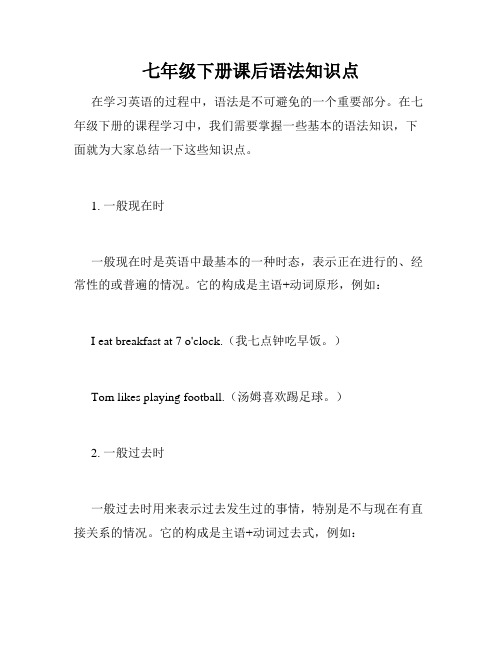
七年级下册课后语法知识点在学习英语的过程中,语法是不可避免的一个重要部分。
在七年级下册的课程学习中,我们需要掌握一些基本的语法知识,下面就为大家总结一下这些知识点。
1. 一般现在时一般现在时是英语中最基本的一种时态,表示正在进行的、经常性的或普遍的情况。
它的构成是主语+动词原形,例如:I eat breakfast at 7 o'clock.(我七点钟吃早饭。
)Tom likes playing football.(汤姆喜欢踢足球。
)2. 一般过去时一般过去时用来表示过去发生过的事情,特别是不与现在有直接关系的情况。
它的构成是主语+动词过去式,例如:I watched a movie last night.(昨晚我看了一部电影。
)She studied hard for the exam.(她为考试努力学习了。
)3. 现在进行时现在进行时表示目前正在进行的动作,它的构成是be动词(am, is, are) + 现在分词(-ing形式)。
例如:I am writing an email to my friend.(我正在写邮件给我的朋友。
)She is watching TV at home.(她在家看电视。
)4. 一般将来时一般将来时表示将来发生的动作或存在的状态,它的构成是will + 动词原形,例如:She will go to the cinema tomorrow.(她明天要去看电影。
)They will have a party next week.(他们下周要开派对。
)5. 动词的情态语气英语中的情态动词有can、could、may、might、must、shall、should、will、would等。
情态动词的意义往往不是单独的,它们常常和不同的动词原形搭配使用,构成不同的语态,例如:She can speak English very well.(她英语讲得很好。
)You should study harder for the exam.(你应该为考试更加努力学习。
- 1、下载文档前请自行甄别文档内容的完整性,平台不提供额外的编辑、内容补充、找答案等附加服务。
- 2、"仅部分预览"的文档,不可在线预览部分如存在完整性等问题,可反馈申请退款(可完整预览的文档不适用该条件!)。
- 3、如文档侵犯您的权益,请联系客服反馈,我们会尽快为您处理(人工客服工作时间:9:00-18:30)。
七年级英语下册语法精讲之一般现在时一、单选题(本大题共100小题,共100.0分)1.In China, spring always from March to May.A. lastsB. beginsC. last2.It often here in winter.Look!It's again.()A. snows;snowingB. snowy;snowingC. snows;snowyD. snowing;snows3.The English class _________ at 16:40 today.A. finishB. is finishC. are finishD. finishes4.--Let your brother Jim_____ you the book In the Name of People.-- _______ good.A. buys ; That soundsB. to buy ; That’s soundsC. buy ; That soundsD. buy ; That’s sounds5.—It often _____ here in winter. —Look! It’s _______ again.A. snowy; snowingB. snow; snowyC. snows; snowingD. snowing; snows6.What are you doing when it _________?A. snowingB. snowC. is snowyD. is snow7.— you free on Sundays?—Yes. I have much to do at weekends.A. Are; aren’tB. Are; don’tC. Do; don’tD. Do; aren’t8.Everyone in our class _________ a good time in the party.A. haveB. hasC. havingD. is9.Students ______ for nine hours a day.A. sleepsB. sleepC. are sleepD. sleeping10.Frank with his parents __________ breakfast at home. It’s happy for them to have it together.A. to haveB. haveC. hasD. having11.Tom with his friends ______ to the zoo every month.A. goesB. goC. is goingD. are going12.The number of students in Class Ten _____sixty-six, and a large number of them ___ JayZhou.A. are, likesB. is, likesC. is, likeD. are, like13.These shoes_____nice. I’ll take a ________.A. looks; oneB. look; shoeC. look; pairD. looks; pair14.Your father ______ buy another TV set.A. doesn’t need toB. needn’t toC. doesn’t needD. needs not to15.Kim with his friends often ________ basketball on weekends.A. playB. playsC. is playingD. are playing16.Where _____ lions come _____ ?A. are; inB. do; fromC. do; inD. are; from17.Five kilometers ______ not very far, you can ride a bike there.A. isB. areC. was18.________he________? No, I ________ not.A. Can, swim, amB. Can, dance, canC. Can, sing, am afraidD. Can, runs, think19.The head teacher with his students ________ Xihui Park if it ________ tomorrow.A. is going to; doesn't rainB. are going to; won't rainC. is going to; won't rainD. are going to; doesn't rain20.The young man’s mother wants to know if he ______her next week. If he _______no timetomorrow, she’ll come to see him.A. visits; will have;B. will visit; will haveC. will visit; hasD. visits; has21.—Look,what a nice library!—Yes, we ____________it every day.A. cleanB. are cleaningC. cleansD. cleaning22.She_______cooking_______her mother.A. is like; likesB. like; likesC. likes; is likeD. likes; like23.The price of these trousers ________$20, and this pair of shoes ________$30.A. is, areB. is, isC. are, isD. are, are24.Everyone ________ him because he often ________ jokes.A. is like, tellsB. is likes, tellingC. likes, tellsD. like, tells25.Jimmy, ______ his brother, ________ playing computer games.A. like,likeB. likes, likesC. like, likesD. likes, like26.--Who_________Chinese? --Mr.Liu.A. teach youB. teaches herC. teaches myD. teaches their27.My teachers ______ Chinese.A. amB. isC. beD. are28.Be careful! Here ________!A. comes the trainB. the train comesC. comes itD. the train is coming29.–Can you tell me _________?A. where does Tom liveB. where Tom livesC. Tom lives whereD. where lives Tom30.There ________some good news for us now.A. isB. areC. wasD. were31.-The party starts at seven, it? -No, it starts in half an hour.A. isn’tB. doesn’tC. doesD. is32.The man ________ curly brown hair ________ a blue sweater.A. has hasB. with; isC. has; wearsD. with; wears33.If it _____ tomorrow, we’ll go camping at cool city .A. not rainB. don’t rainC. won’t rainD. doesn’t rain34.He will call you as soon as he ________ Guilin.A. get toB. arrives atC. reaches toD. arrives in35.No one in our class _____ swimming.A. likesB. likeC. to likeD. is like36.He has few books in his bookcase, ____ _____?A. hasn’t heB. isn’t heC. doesn’t heD. does he37.One of the girls _____ to the USAA. comeB. comesC. areD. goes38.Water _______ 70% of the human body.A. is made ofB. is made up ofC. makes upD. makes from39.Each panda lots of bamboo every day.A. need eatB. need eatingC. need to eatD. needs to eat40.Everyone in our class hard at school.A. studyB. are studyingC. studiesD. studying41.Be careful when you ________ the road.A. acrossB. crossC. throughD. go42.This pair of shoes ______ hand,and it______ very comfortable.A. is made withB. are made from;is feltC. are made of;feelD. is made by;feels43.I will go on a picnic if it ________________ tomorrow.A. won’t rainB. will rainC. rainsD. doesn’t rain44.I____ the book ____ very interesting.A. think; isn’tB. thinks; notC. don’t think; isD. don’t think; not45.If you ________ tomorrow, shall we go boating on the lake ?A. will freeB. will be freeC. are freeD. have free46.Mr Simmons________ a medium build, and he has yellow hair.A. isB. hasC. looks likeD. isn’t47.—________ the man in white Mr. Xu? —No, Mr. Xu ________ glasses.A. Does; doesn’t wearB. Is; doesn’t wearC. Does; isn’t wearD. Is; isn’t wear48.All the food ______the plates _______.A. in, taste wellB. on , tastes wellC. on, tastes niceD. in , tastes nice49.If I ________ next Sunday, I’ll visit my grandparents.A. will be freeB. am freeC. will freeD. isn’t free50.The clothes store is on ________. It ________ all kinds of sweaters.A. sells, sellsB. sale, sellC. sell, salesD. sale, sells。
